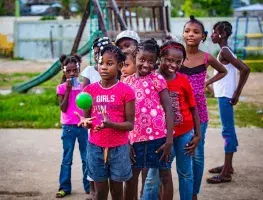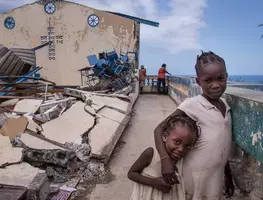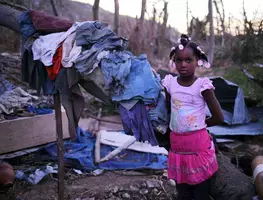Request tailored, remote support on child protection coordination, information management, and thematic areas.
Demander un soutien à distance sur mesure pour la coordination de la protection de l'enfance, la gestion de l'information et les domaines thématiques.
Solicite asistencia remota sobre coordinación en Protección de la Niñez, gestión de la información y otras áreas temáticas.
.قم بطلب دعم مخصص عن بعد في أي من مجالات تنسيق حماية الطفل وإدارة المعلومات أو أي من مواضيع حماية الطفل الأخرى
Haiti
-In Haiti, the deteriorating economic and political conditions and widespread social unrest have had unprecedented humanitarian consequences, and the intensification of humanitarian needs is a symptom of structural fragility, a precarious economic and social system and a lack of resilience to shocks. These needs are reflected in a significant increase in food insecurity and malnutrition, and limited access to basic services such as education, health and water, hygiene and sanitation. Violence, particularly against The number of child labour and gender-based labour has also increased worryingly.
Key Figures
2024 Response Plan in Numbers
Country Overview
Violence and insecurity, social grievances, corruption and weak institutions continue to be concerns in terms of the protection of populations and constitute major obstacles to the realization of human rights in Haiti. The health crisis linked to the COVID-19 pandemic, associated with the socio-economic crisis, has affected the economic and social situation of girls and boys in the most at-risk areas of the country, while the national protection system of the child, under the leadership of the Institute for Social Welfare (IBESR), is underfunded and understaffed to meet the needs of children already in vulnerable situations. can be exacerbated in times of insecurity, natural disasters and / or health emergencies. Individual factors such as personal circumstances and experiences contribute to children's vulnerability, including experiences of abuse including sexual violence, and whether or not they live with their family.
Several U-Report surveys were conducted in 2020 to better understand the views and child protection needs from the perspective of the Haitian population. According to a U-Report poll conducted in October 2020, 80% of respondents deemed violence against girls and women to be a problem in Haiti. Otherwise, a July 2020 poll found that 88% of respondents report the use of physical violence against children. 80% think that physical violence should not be used as a means of discipline. In the context of COVID-19, 34% and 19% respectively believe that children are at risk of physical and sexual violence
In Haiti, there is little data on how affected people view the impact of the humanitarian crisis on their basic needs and living conditions. During the preparation of the Humanitarian Needs Overview in October 2020, focus groups were organized with people with disabilities and representatives of local women's associations in the departments of the South, South East, Center and North-West. These exchanges allowed participants to express their points of view. Their message was clear: "reduce assistantship and strengthen the capacity of communities to take charge", which goes in the direction of the operationalization of the Humanitarian-Development-Peace nexus in Haiti and the strengthening of local systems. and national.
At the strategic level, this was reflected in this response plan by various priority axes: 1) the need to strengthen the humanitarian-development-peace Nexus; 2) better prepare communities to cope with shocks; 3) be more inclusive and prioritize the specific needs of women, children and people with disabilities; 4) review cash transfer strategies to strengthen communities rather than individuals or individual households. These discussions also supported the decision to strengthen the representativeness of Haitians within the Humanitarian Country Team. Thus, from 2021, and for the first time, five national NGOs (three “generalists”, one specializing in gender issues and one working for and with people with disabilities) will be part of the EHP. a working group specifically focused on the needs of people living with a disability was created to support the Humanitarian Program Cycle (HPC). This group is made up of representatives of organizations specializing in disability issues. The group will work on adapting humanitarian interventions to meet the needs of different groups of people with disabilities.
Highlights
- Key resources




